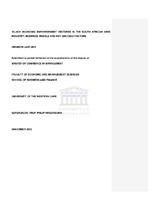Black economic empowerment ventures in the South African wine industry: business models and key success factors
Abstract
Black Economic Empowerment (BEE) is a growth strategy implemented by the South African government to address one of the country’s largest challenges, inequality. However, the failure rate of BEE ventures in the wine industry, and the agricultural sector in general, has been very high. The South African wine industry dates back to the early 1800s, and provides an interesting context to study four cases of relatively new business ventures established since the 1990s. There is limited research that explicitly examines the relationship between the changes after liberalisation and the forms of black entry into the South African wine industry.
The purpose of this research is, firstly, to investigate the business models used by
selected BEE ventures, in order to identify how they contribute to business success. The Osterwalder business model is utilised as a framework to investigate the business models of four BEE business ventures, namely Solms-Delta, Thokozani, M’Hudi and Seven Sisters. Secondly, the paper seeks to establish how ownership structure influences success. To explore this influence, two cases studied are 100% black owned and two cases are joint ventures between black and white owners directly involved in the business. The present study indicates that BEE ventures in the South African wine industry face many challenges but are not necessarily unsuccessful. Findings of the present study are limited to the research sample only. Other empowerment transactions could be used for future investigation.

